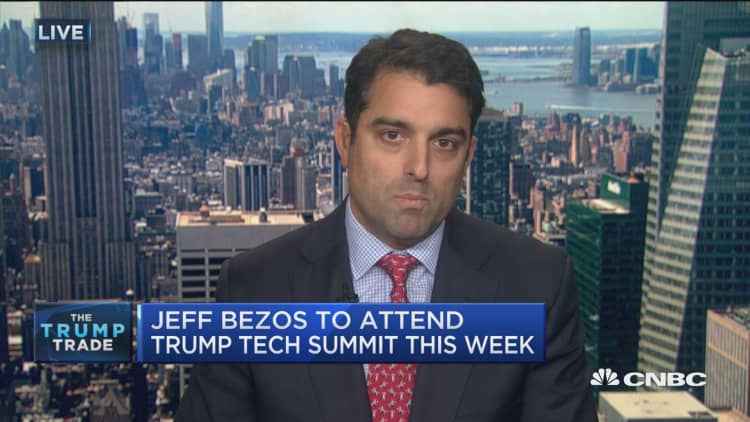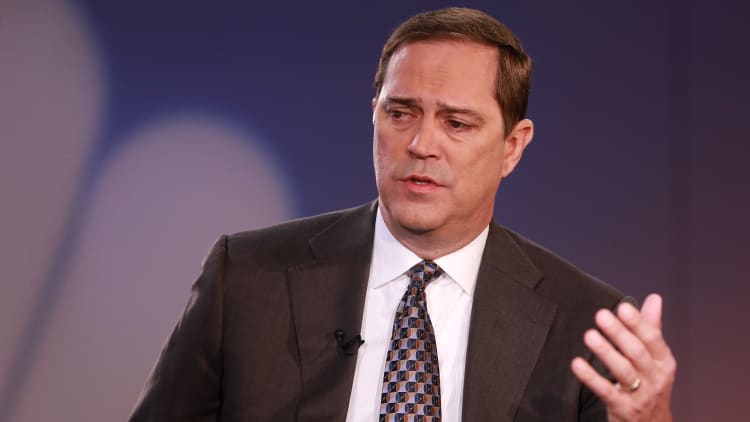
It's been a sobering month for Silicon Valley.
The tech industry was vocally anti-Trump. Internet companies contributed 100 times more money to Hillary Clinton than to Donald Trump in advance of the Nov. 8 election, according to the Center for Responsive Politics. Six Republican candidates received more cash than the industry gave to Trump.
Now that the New York businessman and reality TV star is headed to the White House, technology executives are attempting to chart a path forward. While immigration, trade and climate change remain deep issues of concern, there are potential silver linings for tech in a Trump administration when it comes to tax reform and deregulation.
Expect those topics and more to be on the table on Wednesday, when Trump sits down with technology leaders, including Oracle co-CEO Safra Catz, Cisco CEO Chuck Robbins, Microsoft CEO Satya Nadella and venture capitalist and mega-Trump supporter Peter Thiel. Recode reported over the weekend that Apple CEO Tim Cook, Alphabet CEO Larry Page and Facebook COO Sheryl Sandberg will also be in attendance.
A source told CNBC that Amazon.com CEO Jeff Bezos would attend. Tesla CEO Elon Musk still has not accepted the invitation, according to Recode.
There was mutual disdain between Trump and tech during the campaign. The president-elect took shots at Apple for its reliance on manufacturing in China, swiped at Amazon for supposedly acting as a monopoly and paying too little in taxes and claimed that Google expressed biased against him by manipulating search results.
Where will they find common ground come January? You can bet a primary focus of Wednesday's gathering will be on sparking domestic investments.

One gift that cash-rich tech companies are anticipating is a so-called repatriation holiday on money that's stashed overseas. American companies hold $2.5 trillion in cash outside of the U.S., according to recent calculations from Capital Economics. That's equal to almost 14 percent of U.S. gross domestic product.
Corporations today are unwilling to bring that money back because it would be subject to the country's 35 percent corporate tax rate. Trump wants to lower the rate to 10 percent.
Apple, Alphabet, Microsoft, Cisco and Oracle have about $488 billion combined overseas.
Hypothetically were they to repatriate all of it, the savings over the current tax rate would be about $122 billion. Cisco's Robbins told CNBC last week that his San Jose, California-based company would use some of that money for buybacks, dividends and acquisitions. Additional cash is likely to come from a decreased corporate tax rate, which Trump has vowed to drop to 15 percent from 35 percent.
The prospect of more dealmaking is particularly attractive to start-ups and venture capitalists, who are desperate for returns after the slowest year for tech initial public offerings since 2008.
"It could be huge because it provides a new conduit for existing investments, which is obviously what we think about all the time," said David Golden, a managing partner at Revolution Ventures in San Francisco. "The public capital markets have been such a disappointment for so long. It's been very difficult to exit except through M&A."
Golden has traditionally donated to Democrats, including President Barack Obama's 2012 re-election bid, but he didn't contribute to either candidate this year. His investing partner, AOL co-founder Steve Case, endorsed Clinton, the first time he's publicly taken a side.
Like his colleagues across the industry, Golden's primary concern with Trump is immigration. The president-elect ran on an America-first platform that disparaged undocumented immigrants and slammed companies that were handing over jobs to foreigners at the expense of American citizens. He also proposed a temporary ban on Muslims entering the country.
Trump wasn't specific about his plans for the H-1B visa program, which tech companies use to hire skilled workers from overseas through an annual lottery system. Whether that program takes a hit or not, Golden said he fears that the overall tone toward Asians, Middle Easterners and Latin Americans will lead to a slowdown in imported talent, either due to policy or because the U.S. becomes a less welcoming destination.
"Foreign-born talent is the lifeblood of the tech industry," Golden said. "Not only here in the Valley but really throughout the country."
Even with immigration, there's a potential positive outcome.
Harj Taggar, co-founder of a recruiting technology start-up called Triplebyte, said he's seeing immigrants responding to uncertainty by either holding off on moving here or by applying only to big companies, where there's more security than at start-ups.
But Taggar sees a nuanced way to arrive at some good news. It goes like this. The current system allows for 85,000 people to enter the country annually on H-1Bs. Foreign outsourcing companies like India's Infosys and Tata Consulting are among the top sponsors of immigrants in the U.S., yet they pay far below average for technical jobs, according to the Economic Policy Institute.
They'll be hard-pressed to maintain enforcement on the regulations they have to date.David Goldenmanaging partner at Revolution Ventures
Trump has recommended raising the minimum pay for those admitted to the program to make it more attractive for companies to hire American workers. Should that come to pass, it would no longer be economical for Infosys and Tata to sponsor so many immigrants, increasing the odds that U.S. companies would get access to the best and brightest.
"That would be a big benefit for Silicon Valley," Taggar said.
Then there's regulation. Again, Trump lacks many specifics, but he's promised a more favorable business environment and said after the election that "for every one new regulation, two old regulations must be eliminated."
Bank stocks have soared since Trump's victory on the prospects of a more relaxed regulatory system. Golden said financial-tech companies, a big recipient of venture dollars, could also benefit from a loosening of restrictions on consumer lending. Democratic Sen. Elizabeth Warren, a Trump nemesis during the campaign, conceived the Consumer Financial Protection Bureau as part of the Dodd-Frank Act that followed the financial crisis.
The CFPB has been particularly focused on regulating areas like payday lending and installment lending, mostly because of their high interest rates. Golden sees that agency losing its muscle under Trump, potentially giving fin-tech companies more room to experiment with new products.
"The CFPB had focused on a number of areas that were posing difficulties for venture capitalists that were investing in alternative lending platforms in particular," Golden said. New rules are unlikely and "they'll be hard-pressed to maintain enforcement on the regulations that they have to date."

On the other hand, Trump's view of climate change and alternative energy is very troubling to Silicon Valley.
After describing global warming as a hoax created by the Chinese and now having picked climate change denier — Oklahoma Attorney General Scott Pruitt — to run the Environmental Protection Agency, Trump is leaning toward the opposite side of a debate that techies view as settled long ago.
Todd Chaffee of Institutional Venture Partners succinctly summed up his industry's position toward the choice of Pruitt in a tweet: "UGH!!!!"
UGH!!!! Trump Picks Scott Pruitt, Climate Change Denialist, to Lead E.P.A.
Another topic of deep concern to Bay Area investors, though it may not get a lot of attention at this week's meeting, is Obamacare.
Trump has vowed to repeal and replace the Affordable Care Act, one of Obama's signature achievements. The president increased the number of insured Americans by about 20 million and eliminated the ability for health- care providers to deny coverage based on pre-existing conditions.
But Trump along with the Republican-led Congress is intent on ending Obamacare because they say costs for patients are out of control and choices for care are too few. Insurers, meanwhile, are dropping out of the marketplaces, saying they can't make enough money. Last week, House Speaker Paul Ryan called it a "death spiral."
Tom Rodgers, who runs the venture arm of drug distributor McKesson, said that a drop in federal subsidies will activate state governments and force them to invest in health-care infrastructure and technology to serve their residents.
"You've got all these people you need to provide care for — how do you do that?" said Rodgers, who's based in San Francisco. "It forces you to get more efficient and effective with the dollars that you're spending."
Again, we're talking about silver linings.
Trump and Republican congressional leaders have a plan to repeal Obamacare, but they're nowhere near offering up an alternative that can be implemented without leaving many millions of Americans uninsured. The worst-case scenario, Rodgers fears, is that people lose their health coverage, driving up costs for all parties involved and crippling an already fragile system.
If he could visit with Trump, this would be his key message:
"Rename it or do whatever you want. But don't break it."
— CNBC's Josh Lipton contributed to this report.


